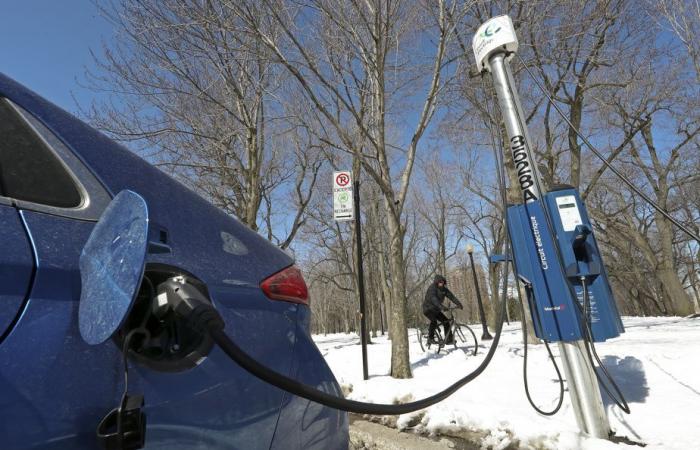(Ottawa) The federal government’s decision to suspend a major incentive measure intended to stimulate sales of electric vehicles will not prevent Canada from meeting its goals of putting more electric vehicles on the road, say some supporters of “zero emissions “.
Posted at 5:57 p.m.
Nick Murray
The Canadian Press
Ottawa announced Monday the exhaustion of its budget devoted to rebates, which reduce the purchase price of electric vehicles by up to $5,000, and that this program was not being extended for the moment.
However, the federal government has required that “zero-emission” light vehicles represent 20% of all new vehicle sales in Canada by 2026, and an increasing share each year thereafter. Light electric vehicles must represent 60% of new vehicle sales by 2030 in Canada and 100% by 2035.
Cara Clairman, founder and CEO of Plug’n Drive, a non-profit organization that promotes the use of electric vehicles, doesn’t believe the disappearance of federal rebates will prevent Canada from reaching its goals. “It’s ambitious, but I don’t think it changes anything in the general direction we need to take,” she said.
Canadian automakers have never supported these mandatory sales targets and reiterated their call for them to be abandoned after the suspension of the federal rebate program. They say Canada has been slow to build its charging station infrastructure, discouraging many consumers from choosing an electric vehicle. Combined with the current high cost of electric vehicles, Canada’s goals are becoming unrealistic, manufacturers say.
The federal rebate has become increasingly popular since its introduction in 2019, as consumer interest in electric vehicles and the number of models available have increased since then.
The federal government paid $140 million to support the purchase of 33,911 vehicles in 2019. But during the first 11 months of 2024, Ottawa paid $927 million to purchase more than 191,000 new electric vehicles, according to the Transport Canada program data. Program statistics for December have not yet been released.
Statistics Canada data shows that 13.5% of new motor vehicle registrations in Canada last year were fully electric or plug-in hybrid vehicles, compared to about 10.6% for the same period in 2023 and 7.7% in 2022.
“Small temporary decline”
Mme Clairman admits that losing the discount might hurt a little at first, but it wouldn’t slow sales for long. “The statistics show that in fact it’s steadily increasing, and we’ll definitely see a little bit of a temporary decline because of that, but it’s still going to be an overall upward trend,” Ms.me Clairman.
The federal government has spent nearly $3 billion on the electric vehicle rebate program since its inception, bailing it out a few times when it ran low on funds. Thus, last year, a sum of 607 million was added to the 2024 budget; the program had paid out nearly 700 million in rebates in 2023.
I think that [le gouvernement fédéral] left the door open to recapitalizing the program or transferring funds from another program.
Joanna Kyriazis, director of public affairs at the think tank Clean Energy Canada
“While the transition to electric vehicles comes with or without rebates, the incentives certainly help Canadians and make their lives easier during a time when we are all strapped for cash. »
Also popular in Quebec
More than 111,000 of these federal rebates had been granted to Quebecers until November of last year, according to Transport Canada data.
The Quebec government has reduced its own incentive for the purchase of an electric vehicle to $4,000 this year, compared to $7,000 last year. He also announced in December that this Roulez vert program would be suspended between 1is February and March 31 of this year, because the budget is exhausted. The Quebec program will offer $2,000 per vehicle in 2026 and will disappear in 2027.
While electric vehicle sales have been down in Ontario after the provincial government abandoned its rebate program in 2018, Ontario received the second highest number of federal rebates among provinces in 2023 and through 2024 , indicating that sales have picked up in recent years. Ontario lagged behind British Columbia in total federal rebates in previous years.
Tesla continued to be the most popular electric vehicle model in Canada last year, with its Model Y accounting for 13% of all vehicles benefiting from the federal rebate through November 2024. Tesla’s Model 3 accounted for more than 6%.






